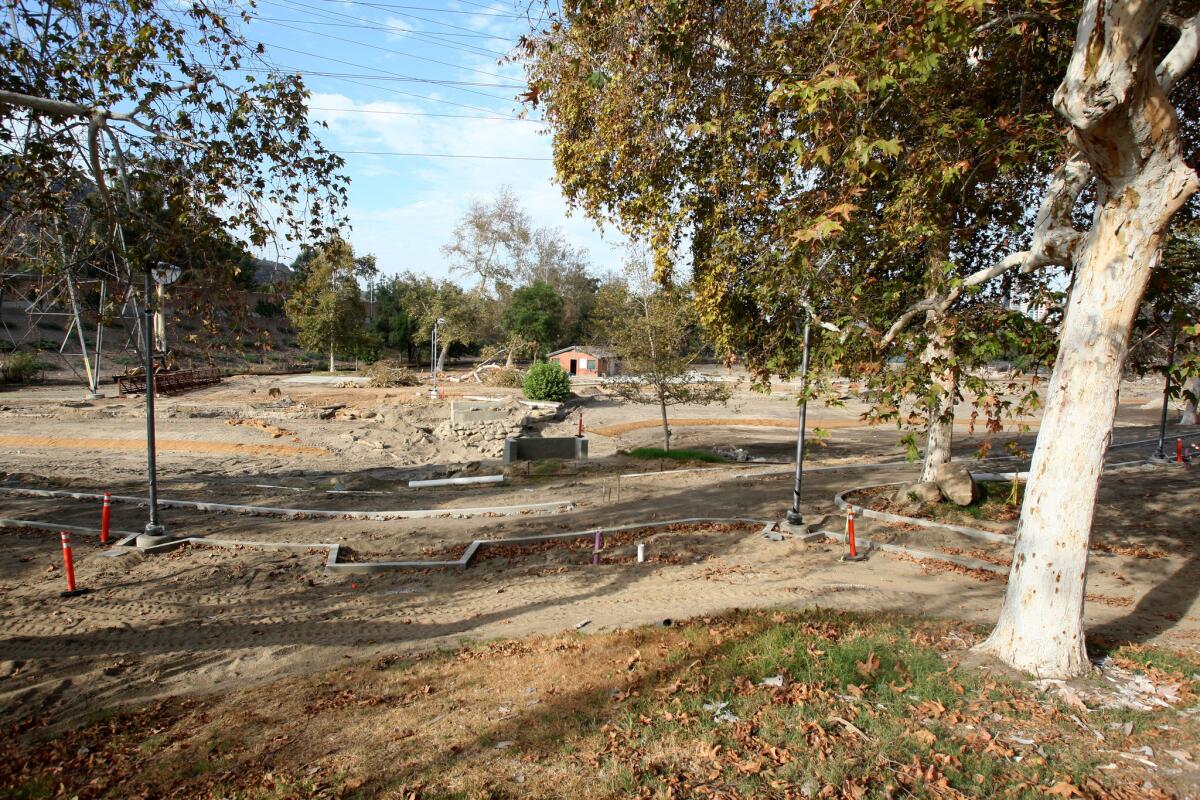Burbank’s Johnny Carson Park is getting a new look

Renovations continue at Johnny Carson Park in Burbank on Thursday, Sept. 10, 2015. The park is scheduled to reopen in early 2016.
The polyphagous shot hole borer, which has been found in trees at Johnny Carson Park, is so ugly. How ugly is it?
The little beetle, which drills into the trees, brings along two types of fungus and lays eggs, which has caused the death of about 50 sycamore trees in the park.
“It’s a definite ugly, ugly situation,” said Judie Wilke, director of the city’s Park, Recreation and Community Services Department. “There’s no way to prevent it and no way to cure it once in the tree.”
Wilke was updating the Parks and Recreation Board Thursday on the ongoing revitalization project at the 17.6-acre Johnny Carson Park. Bordered by Bob Hope Drive and the Ventura (134) Freeway, it’s one of the largest and most used parks in the city, but it has been closed to the public since April while crews complete the $3.7-million project, largely funded through grants.
Part of that effort — the first major renovation of the park since 1977, just five years after its namesake moved “The Tonight Show” to Burbank — will involve planting more than 100 trees, resulting in a net increase in the park, said Sean Corrigan, city engineer, in an interview this week.
Wilke said the new trees will include some larger than the department normally plants to make up for the loss of shade.
“That park had a fabulous canopy and it’s a shame,” she said. “We’re all devastated, devastated by what’s happened.”
According to a University of California Division of Agriculture and Natural Resources website, the beetle was first found in Los Angeles County in 2003, but now appears to be established in Los Angeles, Orange and Riverside counties and is spreading throughout San Diego County.
Corrigan, who is overseeing the Johnny Carson Park project, said the tree issue was the only problem, so far, on the project, which he said is going according to schedule and is more than 60% complete.
An aerial photograph from August shows a brown landscape splotched with green trees on the northeast and southwest corners. Corrigan said the trees have been continually watered throughout the project, while the grass has not, because the park’s irrigation system is being upgraded.
“We’re replacing sprinklers from the ’70s,” he said, adding that though the grass is brown now, it will come back once the irrigation is restored.
Underground mains for recycled water were in place, and crews were readying the smaller pipes for the park’s sprinkler system, he said. The plans also call for spreading fresh grass seed to replenish the turf.
Corrigan pointed out a “snaky” and “sinuous” path winding through the park and some concrete that had been poured for picnic areas as well. Playground equipment has yet to be installed, and he said one of the new playgrounds will have a rubberized surface that will make it accessible for children with disabilities.
A pair of foot bridges are awaiting to be placed across the Tujunga Wash creek that runs through the park and into the Los Angeles River. The creek itself has had the asphalt and concrete bed removed as part of the work to give it a more natural look.
Corrigan said the stream bed, the “keystone” of the project, will be planted with the types of riparian plants that thrive in the beds and banks of streams, which are expected to grow quickly and populate the stream over the course of a few years.
Water will more readily seep into the ground as a result of the change, too, he said.
Wilke said she expects a March reopening for the park. While there have been some “outbursts” of the polyphagous beetle in other locations in Burbank, she said, it’s “nothing as devastating as we’ve experienced at Johnny Carson.”
She said residents who suspect a tree may be suffering from a beetle infestation or other issue can call the forestry services section of the parks department at (818) 238-5304. Someone will inspect the tree within 24 hours, Wilke said. A University of California guide provides more information about the beetle.
--
Chad Garland, chad.garland@latimes.com
Twitter: @chadgarland
